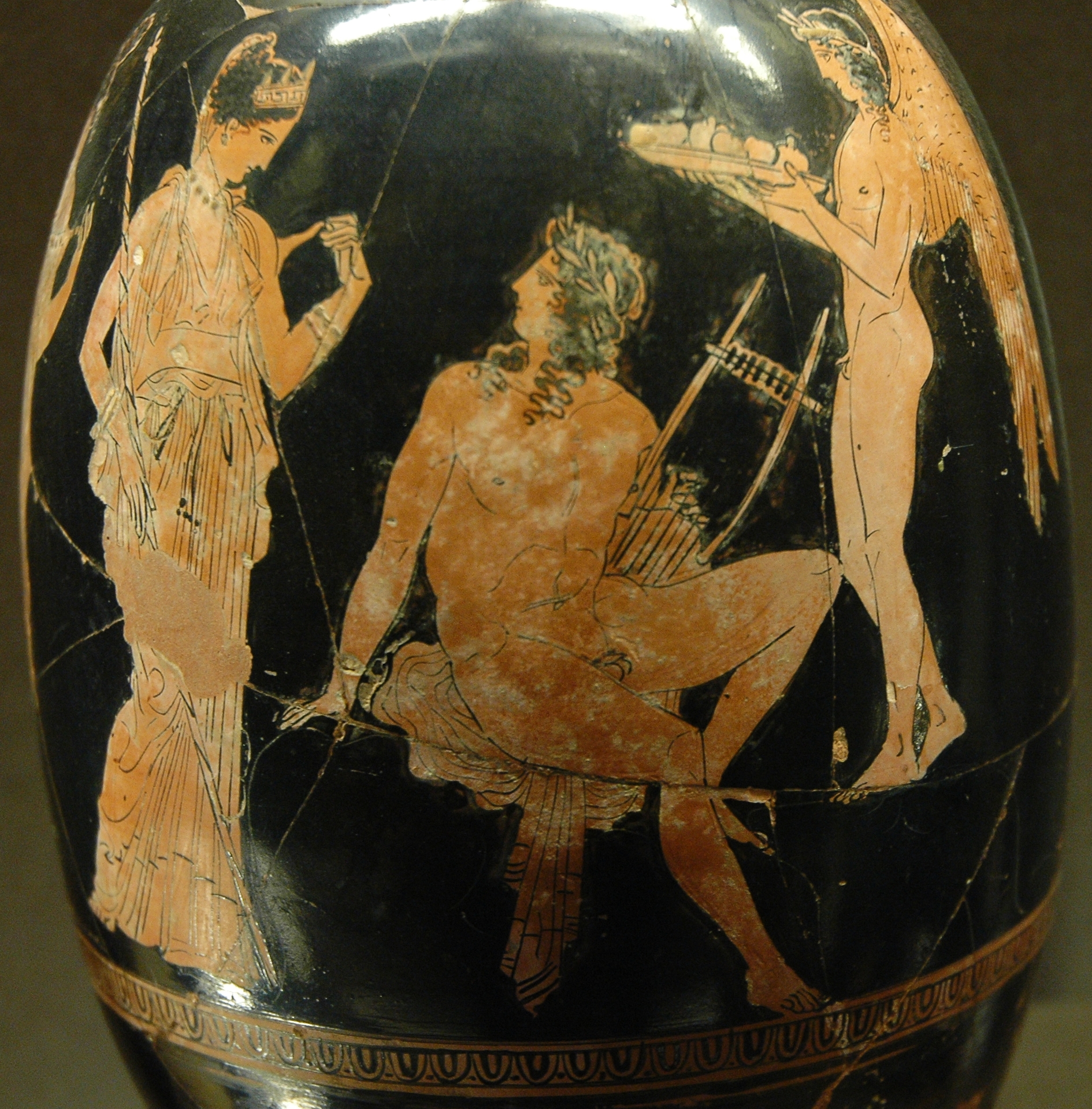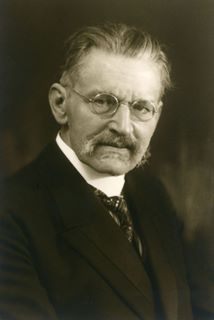|
Skolia
A skolion (from ) (pl. skolia), also scolion (pl. scolia), was a song sung by invited guests at banquets in ancient Greece. Often extolling the virtues of the gods or heroic men, skolia were improvised to suit the occasion and accompanied by a lyre, which was handed about from singer to singer as the time for each scolion came around. "Capping" verses were exchanged, "by varying, punning, riddling, or cleverly modifying" the previous contribution. Etymology Although Greek folk etymology connects skolion with δύσκολος 'difficult', the likeliest connection is with σκέλος 'bent limb, part' as joined verse or repartee. This use is comparable to Japanese renga 'linked verse'. Background Skolia are often referred to as 'banquet songs', 'convivial songs", or 'drinking songs'. The term also refers to poetry composed in the same form. In later use, the form was used in a more stately manner for chorus poetry in praise of the gods or heroes. Terpander is said to have be ... [...More Info...] [...Related Items...] OR: [Wikipedia] [Google] [Baidu] |
Praxilla
Praxilla (), was a Greek lyric poet of the 5th century BC from Sicyon on the Gulf of Corinth. Five quotations attributed to Praxilla and three paraphrases from her poems survive. The surviving fragments attributed to her come from both religious choral lyric and drinking songs (skolia); the three paraphrases are all versions of myths. Various social contexts have been suggested for Praxilla based on this range of surviving works. These include that Praxilla was a hetaira (courtesan), or that she was a professional musician. Alternatively, the apparent implausibility of a respectable Greek woman writing drinking songs has been explained by suggesting that her poetry was in fact composed by two different authors, or that the drinking songs derive from a non-elite literary tradition rather than being authored by a single writer. Praxilla was apparently well-known in antiquity: she was sculpted in bronze by Lysippus and parodied by Aristophanes. In the modern world, she has been refe ... [...More Info...] [...Related Items...] OR: [Wikipedia] [Google] [Baidu] |
Sappho
Sappho (; ''Sapphṓ'' ; Aeolic Greek ''Psápphō''; ) was an Ancient Greek poet from Eresos or Mytilene on the island of Lesbos. Sappho is known for her lyric poetry, written to be sung while accompanied by music. In ancient times, Sappho was widely regarded as one of the greatest lyric poets and was given names such as the "Tenth Muse" and "The Poetess". Most of Sappho's poetry is now lost, and what is not has mostly survived in fragmentary form; only the Ode to Aphrodite is certainly complete. As well as lyric poetry, ancient commentators claimed that Sappho wrote elegiac and iambic poetry. Three epigrams formerly attributed to Sappho have survived, but these are actually Hellenistic imitations of Sappho's style. Little is known of Sappho's life. She was from a wealthy family from Lesbos, though her parents' names are uncertain. Ancient sources say that she had three brothers: Charaxos, Larichos and Eurygios. Two of them, Charaxos and Larichos, are mentioned in the ... [...More Info...] [...Related Items...] OR: [Wikipedia] [Google] [Baidu] |
Herbert Weir Smyth
Herbert Weir Smyth (August 8, 1857 – July 16, 1937) was an American classical scholar. His comprehensive grammar of Ancient Greek has become a standard reference on the subject in English, comparable to that of William Watson Goodwin, whom he succeeded as Eliott Professor of Greek Literature at Harvard University. Life Herbert Weir Smyth was born in Wilmington, Delaware on August 8, 1857. He was educated at Swarthmore ( A.B. 1876), Harvard (A.B. 1878), Leipzig, and Göttingen ( Ph.D. 1884). From 1883 to 1885, he was instructor in Greek and Sanskrit at Williams College, and then for two years, he was reader in Greek at Johns Hopkins. From 1887 to 1901, he was professor of Greek at Bryn Mawr. In the latter year, he was called to Harvard as professor of Greek and in 1902, and he was appointed Eliott professor of Greek literature, succeeding Goodwin. From 1899 to 1900, he was professor of the Greek language and literature at the American Classical School at Athens. From 1889 t ... [...More Info...] [...Related Items...] OR: [Wikipedia] [Google] [Baidu] |
Richard August Reitzenstein
Richard August Reitzenstein (2 April 1861, in Breslau – 23 March 1931, in Göttingen) was a German classical philologist and scholar of Ancient Greek religion, hermetism and Gnosticism. He is described by Kurt Rudolph as “one of the most stimulating Gnostic scholars.” With Wilhelm Bousset, he was one of the major figures of the ''Religionsgeschichtliche Schule'' (history of religions school). His ''Poimandres: Studien zur Griechisch-Ägyptischen und frühchristlichen Literatur'' of 1904 was a pioneer scholarly study of the ''Poimandres'', which he compared to the ''Shepherd of Hermas''. In collaboration with the German Egyptologist Wilhelm Spiegelberg, Richard August Reitzenstein founded a famous collection of Greek and Egyptian papyri, purchased during an expedition in Egypt in 1898/99.Fr. COLIN, ''Comment la création d’une ‘bibliothèque de papyrus’ à Strasbourg compensa la perte des manuscrits précieux brûlés dans le siège de 1870'', La revue de la BNU, 2, 201 ... [...More Info...] [...Related Items...] OR: [Wikipedia] [Google] [Baidu] |
Balliol College
Balliol College () is a constituent college of the University of Oxford. Founded in 1263 by nobleman John I de Balliol, it has a claim to be the oldest college in Oxford and the English-speaking world. With a governing body of a master and around 80 fellows, the college's main buildings are located on Broad Street with additional buildings to the east in Jowett Walk and Holywell Manor. As one of the larger colleges of Oxford University, Balliol typically has around 400 of both undergraduates and graduates. The college pioneered the PPE degree in the 1920s. Balliol has notable alumni from a wide range of disciplines. These include 13 Nobel Prize winners and four British prime ministers. History and governance Foundation and origins Balliol College was founded in about 1263 by John I de Balliol under the guidance of Walter of Kirkham, the Bishop of Durham. According to legend, the founder had abducted the bishop as part of a land dispute and as a penance he was publicly b ... [...More Info...] [...Related Items...] OR: [Wikipedia] [Google] [Baidu] |
Anno Domini
The terms (AD) and before Christ (BC) are used when designating years in the Gregorian calendar, Gregorian and Julian calendar, Julian calendars. The term is Medieval Latin and means "in the year of the Lord" but is often presented using "our Lord" instead of "the Lord", taken from the full original phrase "", which translates to "in the year of our Lord Jesus Christ". The form "BC" is specific to English language, English, and equivalent abbreviations are used in other languages: the Latin (language), Latin form, rarely used in English, is (ACN) or (AC). This calendar era takes as its epoch (date reference), epoch the traditionally reckoned year of the annunciation, conception or Nativity of Jesus, birth of Jesus. Years ''AD'' are counted forward since that epoch and years ''BC'' are counted backward from the epoch. There is no year zero in this scheme; thus the year AD 1 immediately follows the year 1 BC. This dating system was devised in 525 by Dionysius Exiguus but was ... [...More Info...] [...Related Items...] OR: [Wikipedia] [Google] [Baidu] |
Seikilos Epitaph
The Seikilos epitaph is an Ancient Greek inscription that preserves the oldest surviving complete musical composition, including musical notation. Commonly dated between the 1st and 2nd century AD, the inscription was found engraved on a pillar ( stele) from the ancient Greek town of Tralles (modern Aydın in present-day Turkey) in 1883. The stele includes two poems; an elegiac distich and a song with vocal notation signs above the words. A Hellenistic Ionic song, it is either in the Phrygian octave species or Ionian (Iastian) tonos. The melody of the song is recorded, alongside its lyrics, in ancient Greek musical notation. While older music with notation exists (e.g. the Hurrian songs or the Delphic Hymns), all of it is in fragments; the Seikilos epitaph is unique in that it is a complete, though short, composition. Based on its structure and language, the artifact is generally understood to have been an epitaph (a tombstone inscription) created by a man named Seik ... [...More Info...] [...Related Items...] OR: [Wikipedia] [Google] [Baidu] |
Pindar
Pindar (; ; ; ) was an Greek lyric, Ancient Greek lyric poet from Thebes, Greece, Thebes. Of the Western canon, canonical nine lyric poets of ancient Greece, his work is the best preserved. Quintilian wrote, "Of the nine lyric poets, Pindar is by far the greatest, in virtue of his inspired magnificence, the beauty of his thoughts and figures, the rich exuberance of his language and matter, and his rolling flood of eloquence, characteristics which, as Horace rightly held, make him inimitable." His poems can also, however, seem difficult and even peculiar. The Athenian comic playwright Eupolis once remarked that they "are already reduced to silence by the disinclination of the multitude for elegant learning". Some scholars in the modern age also found his poetry perplexing, at least until the 1896 discovery of some poems by his rival Bacchylides; comparisons of their work showed that many of Pindar's idiosyncrasies are typical of archaic genres rather than of only the poet himsel ... [...More Info...] [...Related Items...] OR: [Wikipedia] [Google] [Baidu] |
Symposium Scene Nicias Painter MAN
In Ancient Greece, the symposium (, ''sympósion'', from συμπίνειν, ''sympínein'', 'to drink together') was the part of a banquet that took place after the meal, when drinking for pleasure was accompanied by music, dancing, recitals, or conversation.Peter Garnsey, ''Food and Society in Classical Antiquity'' (Cambridge University Press, 1999), p. 13online Sara Elise Phang, ''Roman Military Service: Ideologies of Discipline in the Late Republic and Early Principate'' (Cambridge University Press, 2008), pp. 263–264. Literary works that describe or take place at a symposium include two Socratic dialogues, Plato's ''Symposium (Plato), Symposium'' and Xenophon's ''Symposium (Xenophon), Symposium'', as well as a number of ancient Greek literature, Greek poems, such as the elegiac couplet, elegies of Theognis of Megara. Symposia are depicted in Ancient Greek art, Greek and Etruscan art that shows similar scenes. In modern usage, it has come to mean an academic conference or m ... [...More Info...] [...Related Items...] OR: [Wikipedia] [Google] [Baidu] |
Ancient Greece
Ancient Greece () was a northeastern Mediterranean civilization, existing from the Greek Dark Ages of the 12th–9th centuries BC to the end of classical antiquity (), that comprised a loose collection of culturally and linguistically related city-states and communities. Prior to the Roman period, most of these regions were officially unified only once under the Kingdom of Macedon from 338 to 323 BC. In Western history, the era of classical antiquity was immediately followed by the Early Middle Ages and the Byzantine period. Three centuries after the decline of Mycenaean Greece during the Bronze Age collapse, Greek urban poleis began to form in the 8th century BC, ushering in the Archaic period and the colonization of the Mediterranean Basin. This was followed by the age of Classical Greece, from the Greco-Persian Wars to the death of Alexander the Great in 323 BC, and which included the Golden Age of Athens and the Peloponnesian War. The u ... [...More Info...] [...Related Items...] OR: [Wikipedia] [Google] [Baidu] |
Anacreon
Anacreon ( BC) was an Ancient Greek lyric poet, notable for his drinking songs and erotic poems. Later Greeks included him in the canonical list of Nine Lyric Poets. Anacreon wrote all of his poetry in the ancient Ionic dialect. Like all early lyric poetry, it was composed to be sung or recited to the accompaniment of music, usually the lyre. Anacreon's poetry touched on universal themes of love, infatuation, disappointment, revelry, parties, festivals, and the observations of everyday people and life. Life Anacreon lived in the sixth century BC. His exact year of birth is not known, with the general scholarly consensus being that he was likely born in the 570s BC: Hans Bernsdorff says c. 575, David Campbell says c. 570. The Suda reports four possible names for his father: Eumelus, Aristocritus, Parthenius, and Scythinus. Ancient sources agree that Anacreon came from Teos, on the coast of Ionia (modern Turkey); this tradition is attested as early as Herodotus, and at least o ... [...More Info...] [...Related Items...] OR: [Wikipedia] [Google] [Baidu] |









